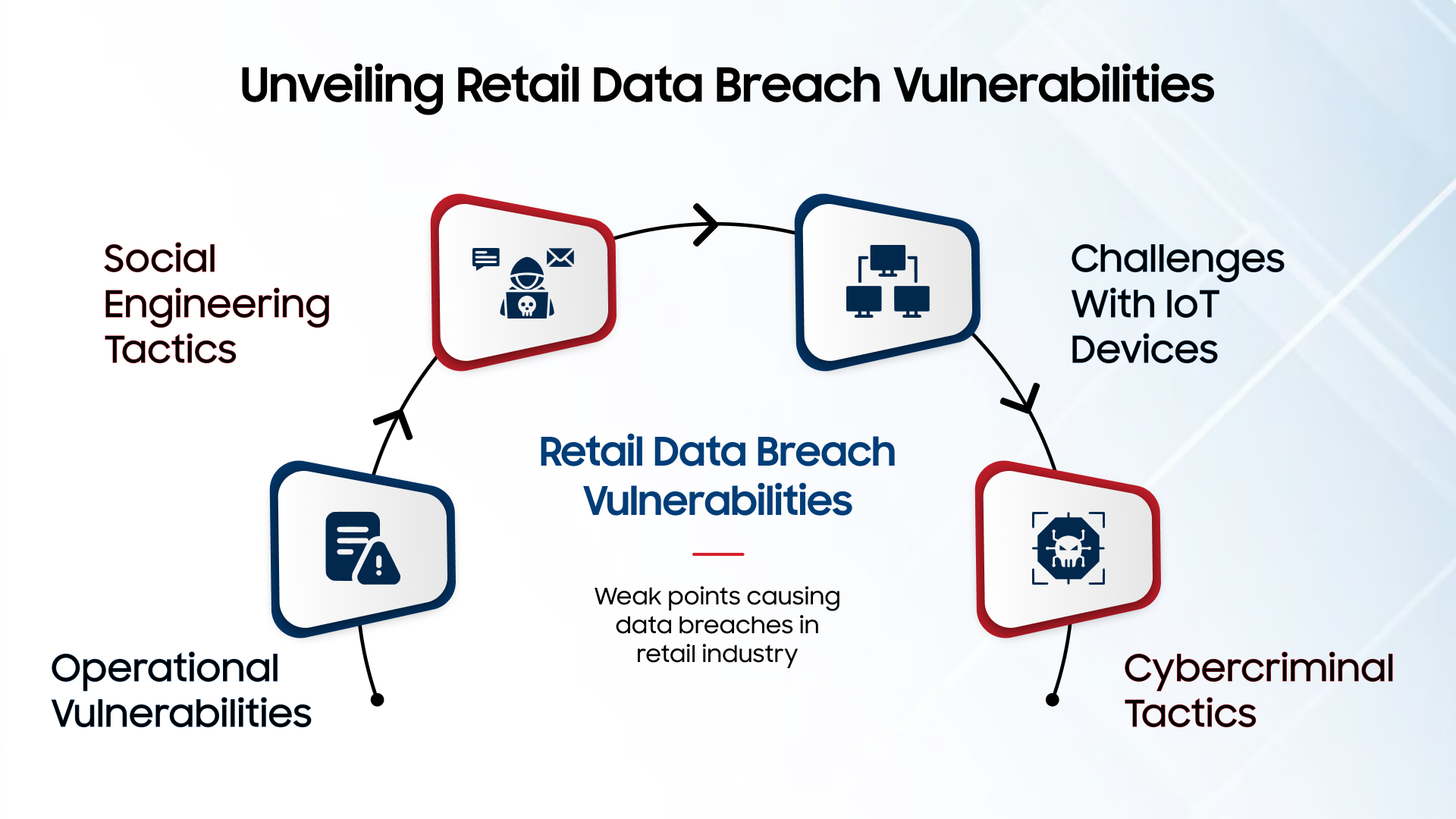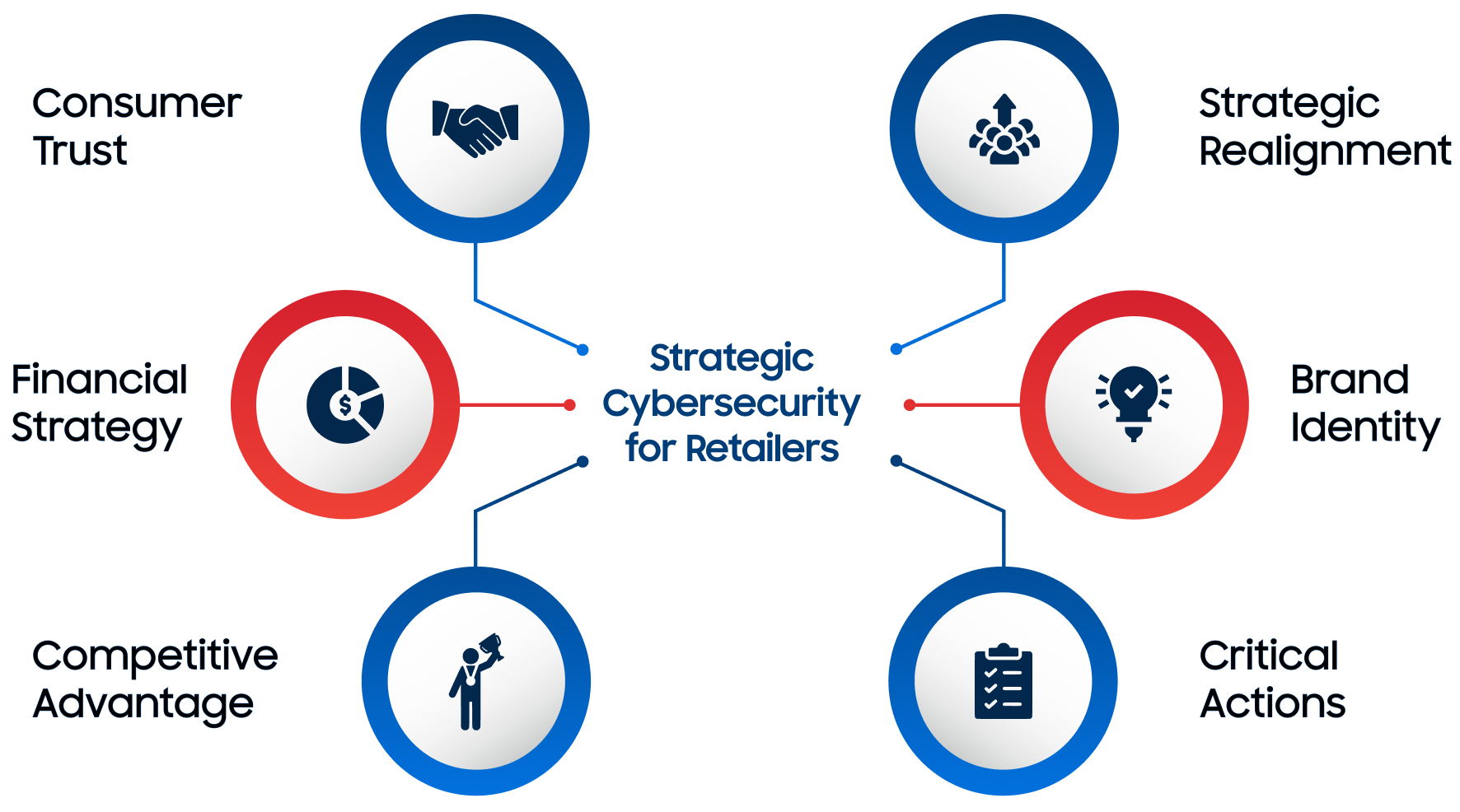The retail industry is facing an escalating crisis as data breaches surge across major retail chains, driven by increasingly sophisticated cyberattacks. These incidents uncover flaws in the online shopping ecosystem. As a result, retailers grapple with cascading consequences:
- Direct financial loss from operational paralysis during attack recovery periods
- Long-term reputational damage as brands become synonymous with data vulnerability
- Dramatic spikes in customer attrition due to broken consumer trust
This highlights the importance of advocating for robust data security as a core retail business strategy.
In this article, we’ll explore the critical impacts of retail data breaches and how cybersecurity services providers can implement strategies for retailers to protect their enterprise and customer trust.
Examining the Ripple Effects of Data Breaches in the Retail Industry
There’s an alarming truth behind data breaches in the retail industry: They unleash a domino effect of consequences reaching far beyond stolen payment data. Cyberattacks can create financial hemorrhaging, operational chaos, and lasting brand toxicity, transforming customer interactions for years.
Direct financial impacts cut hard. Retail breaches now average $2.96 million in direct costs, including containment, fines from noncompliance, and lost sales from e-commerce outages.
But how does a data breach affect a company’s reputation and customer trust? Fundamentally, retailers are prime targets due to vast customer data, leading to fraud monitoring costs when payment records and personal information are stolen.
Further compounding the issue, marketing and PR teams struggle with crisis communication—a complex task of translating technical breach details for public understanding and reassuring anxious audiences about data security.
Operational disruptions cascade unexpectedly:
- Point-of-Sale (POS) security system failures cause in-store purchases to freeze.
- Supply chain management platforms crash mid-season.
- Inventory databases show critical stock mismatches.
While financial penalties sting, brand erosion lingers. Post-breach, 70% of customers abandon merchants, 68% of victims reduce online purchases, behaviorally, and 42% delete accounts, deepening consumer distrust.
Proactive cybersecurity is the most viable insurance plan modern retailers possess. Next, we examine the specific vulnerabilities making merchants low-hanging targets in this escalating digital arms race.
Also Read: Understanding Professional IT Services’ Role in Real Estate
Common Weak Points Causing Data Breaches in the Retail Industry
The prevalence of retail data breaches often stems from inherent operational weaknesses, including outdated technology, porous supply chains, and workforce churn, which leave digital doors unlocked.
Attackers focus on various weak points in retailers:
Operational Vulnerabilities
- Relying on outdated POS security systems that fail to run modern encryption and vulnerable tracking tools increases the risk of cyber threats exploiting those weak links.
- High staff turnover can also increase vulnerabilities.
Social Engineering Tactics
Hackers often resort to:
- Bypassing firewalls by phoning retail IT help desks, posing as staff for credential resets
- Exploiting systems like Active Directory
In fact, 43% of retail cybersecurity threats involve such compromised credentials.
Challenges With IoT Devices
The growing IoT (Internet of Things) device army worsens this:
- Connected devices often use insecure protocols, creating breach points.
- Many third-party vendor security practices are inadequate, hiding risks.
Cybercriminal Tactics
Cybercriminals weaponize mundane data like email lists for psychological warfare. “Harmless” names become phishing campaign gold. When ransomware hits, it can freeze fulfillment and corrupt e-commerce carts.
Recognizing these diverse and deeply embedded vulnerabilities is crucial. Yet, merely identifying them is insufficient. It underscores the need for a fundamental shift to prevent data breaches in the retail industry—which we’ll explore next.
Why Proactive Cybersecurity is Non-Negotiable for Retailers?
Cybersecurity is too often seen as an IT expense, not a core business strategy. Experts now emphasize that retailers who treat cybersecurity as a fundamental business risk will navigate evolving threats most effectively.
For retailers, such strategic realignment requires collaboration among operations managers, IT leaders, and marketing and PR teams responsible for brand stewardship.
For marketing and PR professionals, the path forward involves redefining data protection as inseparable from brand identity—a commitment to customer well-being requiring board-level buy-in and funding.
Consider these critical actions:
- Align security narratives with brand values through campaigns demonstrating encryption standards.
- Integrate breach prevention costs into customer retention budget discussions with C-suite stakeholders.
- Audit third-party vendor risks across supply chain marketing partnerships before holiday campaigns.
A demonstrable cybersecurity commitment now serves as a marketplace differentiator. Retailers prioritizing security as part of the customer experience gain distinct advantages over competitors treating it as a technical afterthought.
Balancing competitive pricing against vital cybersecurity investments. Viewing security through strategic rather than operational lenses allows retailers to:
- Prioritize threat monitoring tools that protect high-value transactional datasets.
- Allocate funds using risk-impact modeling rather than arbitrary percentage-based budgets.
- Publicize security upgrades in PR narratives, highlighting customer protection measures.
With 81% of consumers vetting a company’s security before sharing data, failure risks permanent brand damage and customer loss, extending beyond direct breach costs.
Next, implement concrete measures to fortify defenses and turn cybersecurity investments into drivers of consumer trust.
Strengthening Defenses and Customer Trust Against Retail Data Breaches
The retail industry’s survival hinges on transforming security strategies from reactive firefighting to proactive threat containment. Retailers must adopt complete system visibility solutions that illuminate vulnerabilities across hybrid cloud environments and third-party vendor networks.
Consequently, response effectiveness depends less on technical prowess than on operational clarity. Critically, encryption adoption rates remain dangerously low—few retailers fully encrypt sensitive data despite repeated data breaches in the retail industry.
Implement these non-negotiables simultaneously:
- Deploy next-gen firewalls with integrated decryption engines.
- Replace legacy POS terminals with FIDO2-certified payment systems.
- Mandate quarterly employee training simulations across 100% of staff.
- Implement core security tools, such as up-to-date antivirus software.
- Enforce strong password policies.
- Mandate multi-factor authentication across all critical systems.
- Conduct regular security audits and penetration tests to identify system vulnerabilities and ensure ongoing PCI compliance.
When consumer trust erodes after a breach, transparent communication determines the brand recovery trajectory. Retailers must deliver real-time status updates through preferred customer channels in a simple, lucid language.
Ultimately, sustainable security combines human vigilance with technological precision. As cybercriminal collectives weaponize generative AI, retailers’ cybersecurity investments must fund continual capability upgrades.
By integrating these robust, transparent, and proactive strategies, retailers not only defend against current threats but also build the operational integrity and consumer confidence essential for thriving in today’s digital marketplace.
Securing the Future of Retail Through Vigilant Cybersecurity
The era of treating retail data breaches as isolated IT failures has ended; retailers now navigate a new reality where security-centric brand protection drives survival. Indeed, the recent retail data breaches threaten both the retail industry’s survival and core stakeholder relationships. Businesses that transform through proactive measures will maintain critical consumer trust in this high-stakes climate.
Organizations that frame security as a customer experience priority, rather than a technical overhead, position themselves as market leaders. Therefore, invest in continuous security enhancements while fostering transparency throughout operations.
The stakes have never been higher. For expert IT consulting and proven cybersecurity services, CMIT Solutions, Princeton, New Jersey, protects businesses and delivers enterprise-grade protection. Contact us today for a comprehensive IT assessment!



